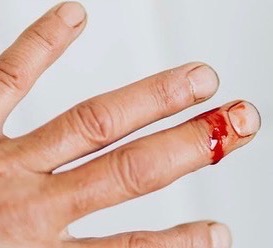Compassion for those who bleed
- rebrhoads
- May 31, 2023
- 3 min read
Huntley Bannister, the main character in The Leavings, has a bleeding disorder known as von Willebrand’s disease. When I began writing The Leavings, I could find little about the emotional impact on sufferers. Von Willebrand’s, like all forms of hemophilia, requires medical supervision and vigilant self-care to avoid episodes of uncontrolled, life-threatening bleeding. It didn’t seem a stretch that being kept from normal boyhood activities would lead to profound psychological effects.
In the following excerpt, Huntley, who works as an auto mechanic, is at a pivotal time in his life. He has just turned 21 and for the first time is in love with a young woman who is not put off by his disease. It is a doomed relationship, however, as his girlfriend’s wealthy parents are bent on keeping them apart. On top of that, his brother is headed to Vietnam, and Patrick, a sparrow that he rescued, is about to leave his care. The scene plays out at the garage where Huntley works:
The former Miss Shirley Dodge, now Mrs. Davis and still teaching sixth grade, brought her car in for a leaky radiator. Neither homely nor beautiful, she bore herself with an almost regal authority that reminded Huntley of the times she had corrected him with the mere glance of her sharp, gray eyes.
“Heavens, Huntley. Last time I saw you, I swear you were a whole foot shorter. How have you been?”
At that moment, Patrick flew down from a rafter and landed on Huntley’s head, which so surprised Shirley, she nearly tripped over a dolly.
“Huntley! There’s a bird on your head!”
“A bird? Mrs. Davis, when did you start smoking pot?”
“It’s right there, on your head,” she insisted. “Go look in a mirror.”
“I know you always thought I was a birdbrain, at least you told me that on more than one occasion, but there’s no reason to insult me now.” Huntley stared at her stone-faced, and unable to contain his amusement, cracked a grin. He put his hand up, Patrick hopped on his finger, and he brought the sparrow down for her to see. “This is Patrick. Patrick, this is Mrs. Davis.” He told of the harrowing rescue at the dangerous, flooded creek. A little embellishment never hurt.
“Do you think he’ll come to me?”
“Give it a try.” Huntley extended Pat toward her.
She put out a finger. Pat cocked his head, and one foot at a time, took the proffered perch. “I never thought you a birdbrain. I only called you that because you exasperated me so.”
“Whew. That’s good to know. My ego is salvaged.”
“What are you reading these days? Mitchener? Dostoevsky?” Unspoken was that the impish child of her sixth-grade class became a bookish introvert in his teens. Unspoken was the awareness of what had happened to Huntley as his disease had slowly strangled his boyhood exuberance.
(Italics added for emphasis)
Huntley has long watched from the sidelines as his brother, Will, and his best friend, Lane, have done all the things he wanted to do but couldn’t. He has been excluded and as a result, finds comfort in books.
Huntley’s character was crafted from my imagination. Turns out, it was pretty spot on.
Recently, I found a blog about von Willebrand’s disease. As one might infer from the title, Girls Bleed Too, it's from a female perspective. Writer Jennifer DeGlopper poignantly pens her experience as a person with von Willebrand’s and how it has affected her physically and emotionally. I quote in part:
“Children with bleeding disorders may have to limit social interactions with peers or other activities they enjoy. I gave up track and dance, for instance, and offered little explanation to my teammates other than saying I had a bad knee. We never discussed my bleeding problems outside of my immediate family. Missing or leaving school because of a bleed was embarrassing; I wanted to fit in, and my parents wanted that for me, too.” From Girls Bleed Too: Hemophilia management takes a toll on patients, yes, but also families.
Huntley’s desire to fit in leads him to make bad choices, particularly in becoming involved with a young woman with whom he has no future, though he artfully renovates an old house to please her. The invisible barrier of his disease leaves him jaded and he becomes a recluse. When Huntley discovers he has a love child, he must come to grips with his self-imposed isolation if he is to have a relationship with her.
We never know the silent pain suffered by people with genetic diseases such as hemophilia. And maybe, in understanding Huntley, we can all have a little more compassion for those who do.





Comments